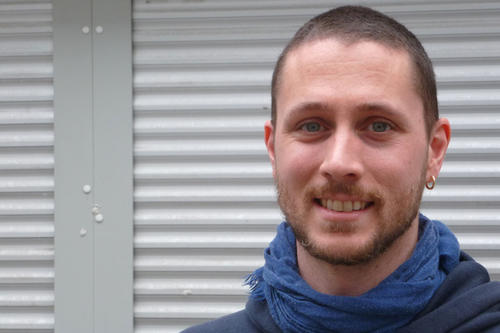Watch out – Risk!
Neuroeconomist Peter Mohr studies what happens in our brains when we make economic decisions
May 20, 2015
Making a decision: Which path should I take?
Image Credit: Marco2811 www.fotolia.de
Junior Professor Peter N. C. Mohr works in the relatively new discipline of neuroeconomics. He studies issues such as how people experience and process risky economic situations.
Image Credit: Lennart Paul
Peter Mohr has dedicated his life to risk. Mohr, a junior professor of neuroeconomics at the School of Business and Economics at Freie Universität, studies how people experience and process risky economic situations, assess risks and react to them, and how the prospects of profits and losses affect their behavior.
Mohr came to Dahlem last summer, through the “career path” model. The program is part of the future development concept of Freie Universität within the German Excellence Initiative, and it supports highly gifted junior scholars and scientists. For example, Mohr is also the head of the Neuroeconomics Dahlem International Junior Research Group at Freie Universität and the Berlin Social Science Center (WZB). In the process, he also looks into his test subjects’ brains on an ongoing basis.
When Mohr simulates investment behavior using simple economic decisions as part of his experiment series, his volunteer subjects are lying inside a magnetic resonance imaging (MRI) unit. The MRI images show the reactions that take place in certain areas of the brain, illustrating how risks are perceived and how the subjects respond. “The oxygen content in the blood increases in those areas of the brain where increased activity is noted,” Mohr explains. If the brain perceives risks to be large ones, he says, this is clearly apparent from the scan. In these cases, the brain displays activity in an area where reactions of disgust are also based.
So does risky behavior cause negative feelings that people have to minimize during economic activities? It’s not quite that simple, of course, Mohr says. “There is a surprisingly high degree of variation in decision-making behavior among test subjects in one and the same situation in our experiments, which are about an hour long. We all have a different understanding of risk and which risks should be avoided.” What Mohr wishes to achieve with his research is a fundamental understanding of economic behavior. In the process, he is also interested in factors that can affect how we make decisions, like age and emotions.
At 33, Mohr is a young scholar in a young field; neuroeconomics has only recently become established as a discipline in its own right. With cognitive neuroscience as its basis, it has become established as an area where psychology and economics meet and overlap, and it could offer laypeople confirmation of the widespread hypothesis that economics is nothing more than the psychology of numbers.
Mohr’s path to neuroeconomics seems a circuitous one at first glance – and yet, it could hardly have been better tailored to get him where he is. Born in Elmshorn, near Hamburg, in 1981, he realized after finishing secondary school that he did not want to go to college in his hometown. He moved to the city of Münster, enrolling in a program in business administration. Mohr’s considerations were strategic ones. As he said, “Economics didn’t seem like the best choice for me in terms of finding a good job afterward. I definitely wanted to go into business at the time.”
Mohr earned his Diplom degree in 2006. The fact that he had only followed his interests in part up until then was something he noticed time and again during his study program, such as when it came time to study business law or taxation. “I was always interested in the areas where people and their behavior played a role,” he says. Mohr continued his academic career as a fellow at the Max Planck Institute for Human Development in Berlin, where he transformed the study of economics into one of the humanities for himself. He became a member of the International Max Planck Research School LIFE doctoral school and earned his doctorate at Freie Universität in 2011 – in psychology. Since then, he has been researching people’s behavior around investments and risks – and at some point, he may be able to offer an exemplary explanation of what kind of behavior causes an investment bubble to burst.
Does Mohr worry that his research findings could be exploited by financial-sector firms? That it might be possible, for example, to use neuroscience to test how to make especially risky products palatable to customers? “It’s hard to predict that,” he says. “We are doing fundamental research here.” As for what may be made of the results of his research later on, it’s hard to say, but Mohr says it is likely that neuroeconomics could prompt people to make better decisions about things like retirement without patronizing them.
Mohr is enthralled by the study of human behavior, even outside his academic activities. His three children are perfect objects of observation. “It’s certainly exciting to see what kinds of decisions they make,” Mohr says, “and, of course, how different their behavior is.”
Further Information
Peter N. C. Mohr, Junior Professor and Head of the Dahlem International Junior Research Group "Neuroeconomics" at Freie Universität, Email: peter.mohr@neuroeconomics-lab.de


